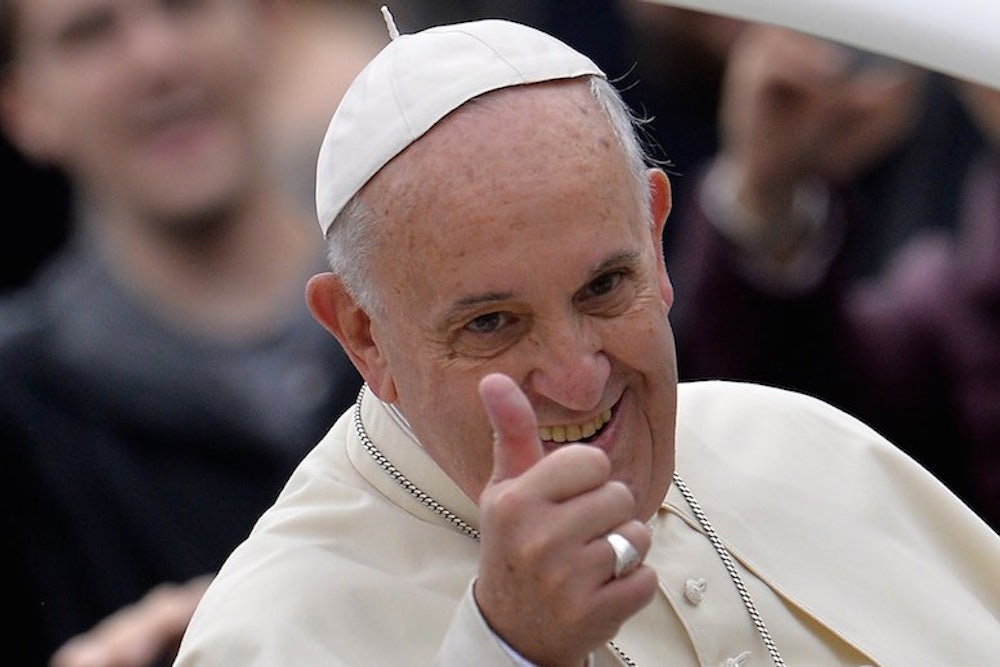On Tuesday, the Pontifical Academy of Sciences hosted a workshop on climate change at the Vatican entitled “Protect the Earth, Dignify Humanity: The Moral Dimensions of Climate Change and Sustainable Humanity.” The workshop, which included several other groups committed to climate change mitigation, was part of a summit on climate change at the Vatican which drew Catholic leaders, academics, and political figures including United Nations Secretary General Ban Ki-moon. As planned, the workshop concluded with a joint statement "on the moral and religious imperative of dealing with climate change.” If the contents of that statement are any indication of the kind of thought that might be contained in Pope Francis’ upcoming encyclical on the environment, then we may well be awaiting the Pope’s most emphatic assault on global capitalism yet.
There is good reason to suspect this might be something of a preview of the yet-unpublished encyclical, which will come out in June. “This meeting is to support the encyclical of the pope,” according to Bishop Marcelo Sanchez Sorondo, a member of the Pontifical Academy of Sciences. Cardinal Peter Turkson cited Pope Francis' 2013 apostolic exhortation Evangelii Gaudium in his remarks at the opening of the summit, suggesting that the conference's proceedings represent a continuation of the spirit of Francis' other work. Prior meetings on the environment have also produced declarations that seem to portend a momentous encyclical. A statement made at last year’s Vatican meet-up on climate change opened by observing that “just as humanity confronted 'Revolutionary Change' (Rerum Novarum) in the Age of Industrialization in the 19th century, today we have changed our natural environment to such an extent that scientists are redefining the current period as the Age of the Anthropocene.” Invoking Rerum Novarum (or: Rights and Duties of Capital and Labor), the bombshell encyclical released by Pope Leo XIII in 1891, suggests Pope Francis might use his upcoming encyclical to take on this latest stage in global capitalism, just as Rerum took on its early stages at the close of the 19th century.
Tuesday's joint declaration deals clearly and sharply with our era in history, which some might call the Age of the Anthropocene and others late capitalism. “The poor and excluded face dire threats from climate disruptions, including the increased frequency of droughts, extreme storms, heat waves, and rising sea levels,” despite the fact that the “world has within its technological grasp, financial means, and know-how the means to mitigate climate change while also ending extreme poverty.” For the statements’ signatories, ensuring sustainable production is as vital to the relief of the global poor as ensuring the just distribution of goods, a view which throws cold water on climate change skeptics’ claim that taking action on the environment will harm the world’s poorest people.
The statement also suggests radically redistributionist remedies to poverty and inequality: “The financing of sustainable development, including climate mitigation, should be bolstered through new incentives for the transition towards low-carbon energy, and through the relentless pursuit of peace, which also will enable the shift of public financing from military spending to urgent investments for sustainable development.” So much for Patty Murray and Paul Ryan’s defense-boosting 2016 GOP budget! The declaration even states that "high-income countries should help to finance the costs of climate-change mitigation in low-income countries.” That mitigation "will require a rapid world transformation to a world powered by renewable and other low-carbon energy and the sustainable management of ecosystems,” the declaration concludes, observing, “These transformations should be carried out in the context of globally agreed Sustainable Development Goals, consistent with ending extreme poverty; ensuring universal access for healthcare, quality education, safe water, and sustainable energy; and cooperating to end human trafficking and all forms of modern slavery.”
The greater political resonance of the statement concerns the expectation of global cooperation and the use of policy to close the widening gap between the world’s rich and poor. The proposal to use policy measures to achieve more participatory democracy and universal access to public services like water and energy, as well as improved social policies when it comes to healthcare and education, will surely alienate conservatives who oppose climate change legislation on the grounds that it hurts businesses’ profits. As usual, Francis’ papacy seems to breed very little patience with the tired objections America’s well-to-do politicians typically air when it comes time to improve the lives of the poor: that such things should be left to volunteer efforts or employers, that inequality is not a pressing moral issue, that nobody has a human right to healthcare, education, and so on. If today’s joint statement is any glimpse into Francis’ encyclical and the kind of message he might bring to the United States when he visits in September, right-wing Catholics in Congress should get to work now explaining why they won't be taking any of the Pope's words on climate change to heart.
